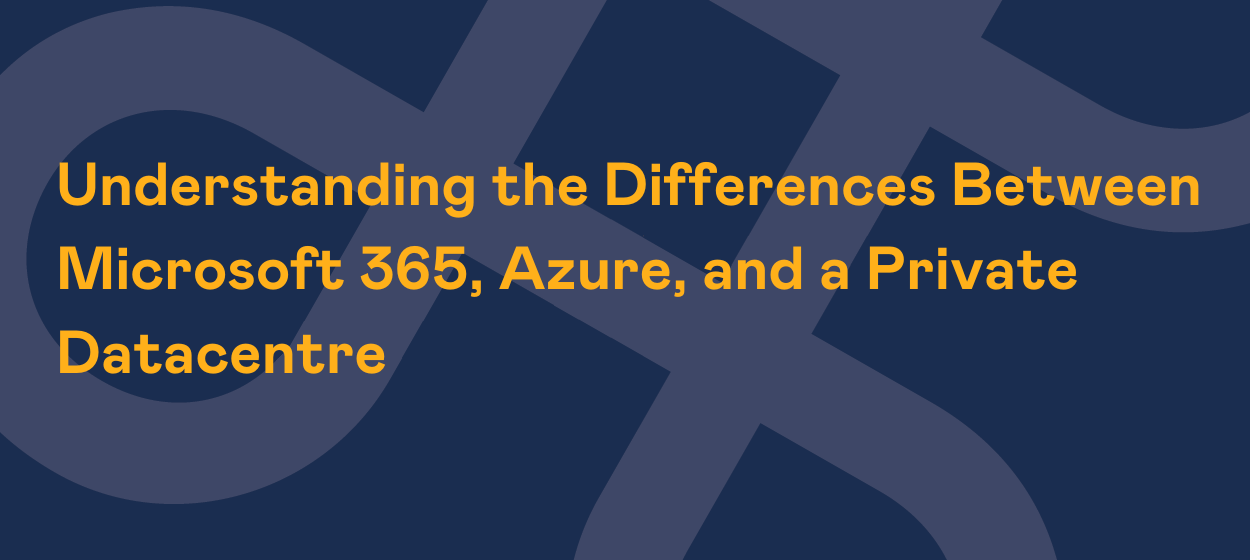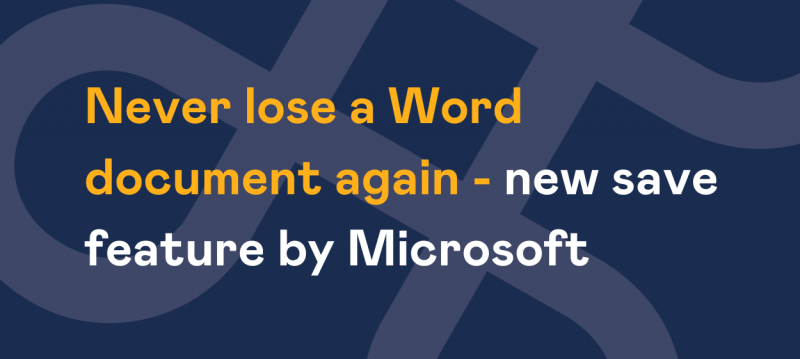In today’s digital world, businesses have more choices than ever when it comes to managing their IT infrastructure and tools. From cloud-based platforms to on-premises solutions, understanding the key differences between Microsoft 365, Azure and a private datacentre is essential for making informed decisions.
Much like our approach to IT, we want to be upfront and help you understand what each is so you what you’re dealing with.
Here are some quick definitions:
Microsoft 365: A cloud-based suite for productivity tools like Word, Excel and Teams. Perfect for remote work and collaboration.
Azure: A flexible cloud platform offering scalable infrastructure, databases and AI services. Ideal for growing businesses.
Private Datacentre: Provides full control over your IT infrastructure. Requires heavy investment in hardware and maintenance.
In this article, we’ll break down each option and explore how they cater to different business needs.
Microsoft 365: The Productivity Powerhouse in the Cloud
Microsoft 365 is a cloud-based suite of productivity tools designed to help businesses and individuals communicate, collaborate, and get work done from anywhere. It includes popular applications like Word, Excel, Outlook, and Teams, all accessible via the cloud.
With Microsoft 365, you’re no longer tied to a physical office or a specific device. All your files and applications are stored online, so you can easily access them on the go, collaborate in real-time, and work seamlessly across devices. It’s a Software as a Service (SaaS) model, meaning that you simply subscribe and use the tools without worrying about maintaining the software or infrastructure.
Key Benefits:
Mobility: Work from anywhere with internet access.
Collaboration: Real-time collaboration on documents and projects.
Cost-effective: Subscription-based pricing with no need for upfront hardware investment.
Azure: The Cloud Infrastructure for Scaling Your Business
Microsoft Azure is a powerful cloud platform offering a broad range of services, including virtual machines, databases, storage solutions, artificial intelligence (AI), and more. Azure is designed for businesses that need flexible, scalable infrastructure to host applications, run analytics, or manage large amounts of data.
As an Infrastructure as a Service (IaaS) and Platform as a Service (PaaS) provider, Azure allows businesses to move their IT operations into the cloud, reducing the need for on-site hardware. The pay-as-you-go pricing model is another attractive feature, as businesses can scale their resources up or down based on demand, avoiding the capital expenditures that come with maintaining physical servers.
Key Benefits:
Scalability: Easily scale resources as your business grows.
Flexibility: Wide range of services from hosting to AI and big data.
Cost management: Pay only for what you use, with no upfront investment in hardware.
Private Datacentre: Full Control, But With High Responsibility
A private datacentre is a physical facility that a business either owns or leases, where it stores and manages its IT infrastructure. While cloud services like Microsoft 365 and Azure provide convenience and flexibility, some organisations prefer or require a private datacentre for their specific needs, such as complete control over security, data management, and hardware customisation.
Private datacentres offer unmatched control over every aspect of your infrastructure, but they come with significant responsibilities. Businesses must invest in purchasing servers, networking equipment, and cooling systems, and they are also responsible for ongoing maintenance and upgrades. For industries with strict compliance requirements, private datacentres might be essential, but they can also limit the ability to scale efficiently compared to cloud platforms.
Key Benefits:
Control: Full control over hardware, data, and security protocols.
Customisation: Ability to tailor the infrastructure to specific business needs.
Compliance: Suitable for industries with strict regulatory requirements.
Which Solution Is Right for You?
Choosing between Microsoft 365, Azure or a private datacentre depends on your organisation’s unique needs.
If you’re looking for easy-to-use productivity tools that your team can access from anywhere, Microsoft 365 is a great option.
For businesses that need flexible infrastructure with the ability to scale on demand, Azure provides an extensive array of cloud services.
Meanwhile, organisations that require full control over their infrastructure and have the resources to manage it may opt for a private datacentre.
Ultimately, many businesses adopt a hybrid approach, using a combination of cloud services and private infrastructure to balance flexibility, control and cost-effectiveness.
For more expert advice about any of the products listed above or even a chat about which one(s) might be best for your business, please contact my team today!





